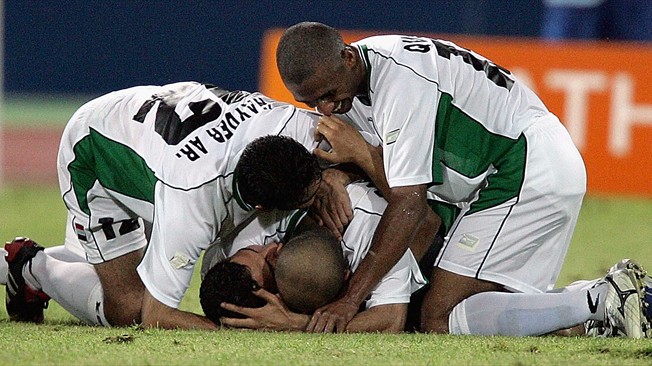Zurich – Switzerland, July 22, 2012: Arab teams, Three teams will be flying the flag for the Arab game at the Men’s Olympic Football Tournament London 2012, with Egypt, Morocco and United Arab Emirates all hoping to make their mark.
The competition’s 16 previous editions have seen a grand total of ten Arab countries tilt at the Olympic title, with the best result so far a fourth-placed finish, achieved by Egypt in 1928 and 1964, and by Iraq in 2004. With just days to go until this year’s tournament kicks off, FIFA.com takes a look back at the Arab world’s impact on Olympic football and sizes up its representatives’ chances at London 2012.
A long history
The first time an Arab team took part in the Men’s Olympic Football Tournament was way back in 1920 when Egypt put in a brief appearance, only to be knocked out after losing 2-1 to the Italians in their first and only game.
At the time, Egypt were the sole side from the region capable of competing at the highest level and in 1928 they achieved their best result to date, defeating first- and second-round opponents Turkey and Portugal respectively to make it into the final four. A podium finish still evaded their grasp, however. Heavily beaten by Argentina in the semi-finals, they went on to lose to Italy in the play-off for third place.
It was not until 1960 that more than one Arab team qualified for the Olympic finals, when Tunisia accompanied Egypt to the Games in Rome. Four years later in Tokyo it was Morocco’s turn to make their debut, while the ever-reliable Egypt put in a sterling performance to qualify from the group stages ahead of Brazil on goal difference before defeating Ghana 5-1 in the quarter-finals.
Defeat to eventual champions Hungary in the semi-final left them needing to beat the former East Germany in the third-place play-off if they were to surpass their 1928 benchmark and claim bronze, but a 3-1 loss put paid to that dream. Nevertheless, it was a respectable result against strong opposition, with Egypt striker Ibrahim Riad claiming runners-up spot in the goalscorers’ standings behind Hungarian Ferenc Bene.
After missing out at Mexico City, Arab nations made a comeback at Munich 1972 in the shape of Morocco and Sudan. Subsequently at Moscow 1980 a total of four teams from the region took part, with Algeria, Iraq, Kuwait and Syria all making their first appearance.
Arab football was in the ascendancy and by Los Angeles 1984 the number had risen to five, with Olympic veterans Egypt, Iraq and Morocco joined by the new boys from the Gulf: Qatar and Saudi Arabia. Quantity does not always bring quality, however, and of these five only Egypt made it past the first round before being knocked out after a 2-0 defeat by quarter-final opponents France.
This final-eight finish from Egypt was the best effort from an Arab side at the Games from that point until the 2004 edition in Athens. It was then that a plucky Iraq squad battled their way through to the semi-finals, ending up in fourth place.
Having topped a group comprising Costa Rica, Morocco and a Cristiano Ronaldo-inspired Portugal, Adnan Hamad’s charges went on to beat Australia before succumbing to successive defeats against Paraguay and Italy – in the semi-final and match for third place respectively – at the end of a highly creditable Olympic campaign.
Hopes and dreams
Unrepresented at Beijing 2008, London 2012 represents a golden opportunity for Arab football to go for glory. Egypt and Morocco will be looking to equal or better their past performances, while debutants UAE are keen to impress on their first appearance.
They will have their work cut out for them. The Emirates are in a group containing hosts Great Britain, Senegal and Uruguay; Egypt face an uphill slog against Belarus, Brazil and New Zealand; while Morocco have the unenviable task of negotiating a path past Honduras, Japan, and all-conquering Spain.
“The London Games won’t be easy,” UAE captain Hamdan Al Kamali told FIFA.com. “Though we’re delighted we’ll be playing at some of the most historic grounds in the world, such as Wembley and Old Trafford. I hope we can live up to the responsibility and put on a performance that reflects how far football has come in the Emirates.
“Our main goal is to qualify from the group,” continued Al Kamali, who was clearly keen to keep his side’s chances in perspective. “If we manage that then things get easier, because the semi-finals are just a game away. I hope we can do it.”
The Egyptians, for their part, will be hoping that London 2012 can get them back on track after disappointing results over the past two years. “We’re going to the Olympics after a 20-year absence,” explained coach Hany Ramzy, who must help his squad deal with the weight of expectation on their shoulders.
“But everyone still expects a lot, for us to come back with a medal at the very least, and the pressure only increased when the national side got knocked out of the African Nations qualifiers,” he added. “Our supporters are hanging their hopes on the Olympics and I really hope we can deliver.”
Meanwhile, morale is high in the Morocco camp, with their experienced Dutch coach Pim Verbeek already stating that the team’s priority is to reach the quarter-finals. “Winning the first game is the key to qualifying from the group stage,” he said, his determination clear. “I hope we can achieve our objective and that the fans get behind us, so we can get good results and show the world what Moroccan football is all about.”
Have your say
Will one of the Arab teams spring a surprise and snatch a medal at London 2012? —- FIFA/Picture © Getty Images


Leave a Reply
You must be logged in to post a comment.